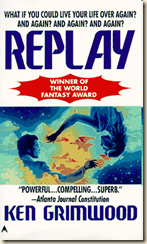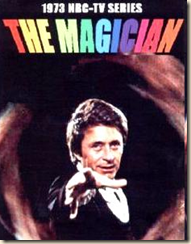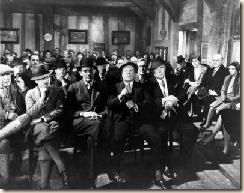 (1987)
(1987)
Written by Ken Grimwood
Replay is based on an idea we probably have all had: what would I do if I could live my life over?
Ken Grimwood takes that and gives it a wonderful twist: what would I do if I could live my life over and over and over and over?
In the book, 43-year-old Jeff Winston, unhappy with his marriage, suffers what he thinks is a heart attack. And waked up back in time, as an 18-year-old with all the knowledge of what will happen in the future.
Jeff quickly does what you might expect: bets on sporting events and turns himself into a millionaire. It's handled quite well: Jeff doesn't remember all the winners and sometimes doesn't bet because of it. He also ends up making a hash of his personal life. And when he gets to be 43, it all happens again.
Grimwood plays through the variations with a lot of thought and a great deal of interesting detail. The world changes each time Jeff travels back, due the choices Jeff makes. He even finds that someone else is going through the same thing, a woman whose presence he discovers when movies are made that had not been made in his timeline, and they spend lifetimes together because they are the only people who can share the secret.
And things advance; it's clear very early on where things are going, but the ending goes back to the original scene, and pulls out a wonderful and fascinating twist that reflects back on the entire experience.
It's also a damn good read. I picked it up and finished it in a weekend and found it to be a book I just couldn't put down.
Replay ended up winning the World Fantasy Award, and is on many best fantasy book lists, but does not have the fame it deserves.
Grimwood took his time following up and it was eight years before his next novel, Into the Deep, was out. It didn't make a particular mark (I didn't much care for it), and two others after that also made little impression. Sadly, Grimwood died young at age 59. Even sadder, he was working on a sequel to Replay when he died.
(Note. I had hoped to include a picture of the original hardcover edition, but I can't seem to find it on the web. This is from a later paperback.)



 The strip had some features that made it different:
The strip had some features that made it different:
 Their first album, Picking up the Pieces, was a triumph. The combination of rock and country was seamless, and it had such great songs as "Just in Case It Happens, Yes Indeed," "Consequently So Long," the terrific instrumental "Grand Junction," and the title song. Meissner left just after the album was completed, eventually ending up with the Eagles, and was replaced by Timothy B. Schmidt (who also eventually ended up with the Eagles) Their second album, Poco, had the great tune "Hurry Up," though was not quite as good as the first -- which was a hard act to follow.
Their first album, Picking up the Pieces, was a triumph. The combination of rock and country was seamless, and it had such great songs as "Just in Case It Happens, Yes Indeed," "Consequently So Long," the terrific instrumental "Grand Junction," and the title song. Meissner left just after the album was completed, eventually ending up with the Eagles, and was replaced by Timothy B. Schmidt (who also eventually ended up with the Eagles) Their second album, Poco, had the great tune "Hurry Up," though was not quite as good as the first -- which was a hard act to follow.
 The justification of this is handled quite logically, but it, alas, was turned into "Julie Christie gets raped by a computer." And the knives came out.
The justification of this is handled quite logically, but it, alas, was turned into "Julie Christie gets raped by a computer." And the knives came out.
 As expected, Robinson is excellent. You can tell when he is Jonesy and when he's Manion by the way he moves and carries his body, and the expression he takes. At a certain point, Jonesy has to pretend he is Manion and you can see him changing things to make a facsimile of his full-Manion act.
As expected, Robinson is excellent. You can tell when he is Jonesy and when he's Manion by the way he moves and carries his body, and the expression he takes. At a certain point, Jonesy has to pretend he is Manion and you can see him changing things to make a facsimile of his full-Manion act.